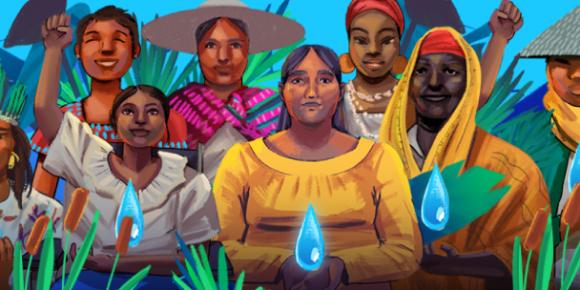GAGGA launches 2022 #WeWomenAreWater campaign

*Scroll down to access the campaign stories
Enough with false climate solutions, the time is now to resource gender-just solutions to the water and climate crises
The second instalment of the Intergovernmental Panel on Climate Change’s (IPCC) Sixth Assessment Report made it clear last week: climate change is a threat to human well-being and planetary health, and any further delay in concerted global action will miss a brief and rapidly closing window to secure a liveable and sustainable future for all.
The report also clarified another point: bringing together scientific, Indigenous and local knowledge while prioritising justice and equity will lead to more effective climate solutions. Such solutions already exist and are being implemented by women, girls, trans, intersex and non-binary people around the world — those who are usually first to be affected by climate change impacts and who lead local climate actions despite being overlooked in decision-making processes. Dependent on natural resources, these people are using local, traditional and Indigenous knowledge to develop climate solutions that secure and protect water resources — from coastal habitat restoration and community water management to rainwater harvesting systems and food forests.
Unfortunately, these initiatives are grossly underfunded, and the people most impacted by climate change and climate-related water scarcity are largely excluded from accessing financing that supports mitigation and adaptation actions to address climate change. Only 0.01% of funding worldwide supports projects that address both climate and women’s rights.
That’s why this year we will be showcasing gender-just climate solutions related to water during our annual #WeWomenAreWater campaign from International Women’s Day (March 8) to World Water Day (March 22). These cases illustrate to international financial institutions and climate funds the need to shift resources away from environmentally destructive projects that violate human rights and negatively impact water, like large dams and monoculture tree plantations, to community-led initiatives that address climate change while actively challenging gender inequalities. We also ask that investors and pension funds aligning their investments with the Sustainable Development Goals expand their commitments to include these local climate solutions.
Starting from International Women’s Day, the Global Alliance for Green and Gender Action (GAGGA) and our partners will be posting stories on social media from Guatemala, Paraguay, the Philippines, Nepal, and Nigeria where climate finance actors invest in technical solutions to the climate crisis which protect corporate profits while negatively impacting critical ecosystems along with people’s access to land, food sovereignty and water. We will also spotlight cases where GAGGA-supported communities’ limited water security is compounded by the continued investment in fossil fuel extraction. While these stories make up a small sample, they reflect the reality of many communities across the globe.
Gender-just, inclusive and sustainable climate solutions already exist on the local level – it’s time to resource them. Join the campaign to demand that climate financing support these women-led, transformative climate solutions that prioritise people and planet instead of ‘business-as-usual’ solutions.
You can also find this campaign statement in Bahasa Indonesia, Filipino, French, Hindi, Mongolian, Nepali, Portuguese, and Spanish.
Check out the social media toolkit, available in Bahasa Indonesia, English, Filipino, French, Hindi, Mongolian, Nepali, Portuguese, and Spanish.
You can follow the campaign on Facebook, Instagram and Twitter using #WeWomenAreWater and #LasMujeresSomosAgua.
____________________________
Campaign stories
Women restore mangrove forests in the Niger Delta
Magar women use Indigenous knowledge to mitigate climate change impacts
Qom organize to preserve their territory in the Paraguayan Chaco
Dumagat women use non-timber forest products to mitigate and adapt to climate change
Mayan Ch’orti’ women recover their territorial rights and water access
Above graphic illustrated by Andrea Paredes.

Media Inquiries
For media inquiries around this campaign, please get in touch with the communications team:





